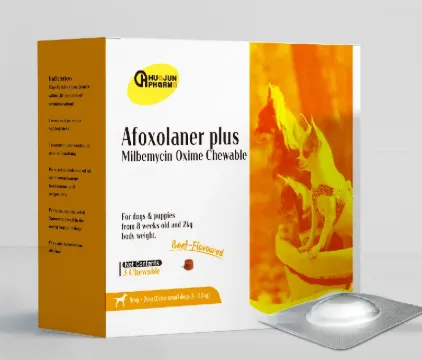
Apr . 24, 2025 10:18 Siyahıya qayıt
Is Dewormer Safe for Kittens and Senior Cats?
Deworming is an essential part of pet care, ensuring that cats remain healthy and free from parasites. However, pet owners often wonder whether types of dog wormer and types of dewormer for cats are safe for kittens and senior cats. The safety of these treatments depends on various factors, including the age of the cat, the type of worm infestation, and the specific ingredients used in the worm medicine. This article explores the safety concerns associated with bulk dog dewormer and cat dewormers, highlighting how to use them effectively for kittens and older felines.

Understanding the Different Types of Dewormers
There are multiple types of worm medicine available for cats and dogs, each designed to target specific parasites. The most common types of dewormer for cats include:
Common Dewormers for Cats and Dogs:
- Pyrantel Pamoate– Effective against roundworms and hookworms, commonly used for kittens.
- Fenbendazole– A broad-spectrum dewormer that treats multiple parasites, often used in bulk dog dewormer.
- Praziquantel– Used for tapeworms and safe for most adult cats.
- Ivermectin– Works against a variety of internal and external parasites, though it must be used with caution in certain breeds.
Choosing the Right Dewormer for Different Life Stages:
- For Kittens: Young kittens have delicate digestive systems, so mild dewormers like pyrantel pamoateare often recommended.
- For Senior Cats: Older cats may have weaker immune systems, making it important to choose gentle but effective dewormers such as fenbendazoleor praziquantel.
Safety of Deworming Kittens
Is deworming safe for kittens? Absolutely—but with precautions. Young kittens are highly susceptible to worms, which they can contract from their mother’s milk or the environment. However, their small bodies require a gentle yet effective worm medicine.
Guidelines for Deworming Kittens:
- Start early: Kittens should be dewormed starting at 2-3 weeks old and continue every 2-3 weeks until they are 8-12 weeks old.
- Use age-appropriate dewormers: Avoid harsh dewormers that are designed for adult cats or bulk dog dewormer, as they may be too strong for kittens.
- Monitor for side effects: Mild diarrhea or lethargy can occur, but persistent symptoms should be reported to a vet.
Deworming Senior Cats: What You Need to Know
Older cats may experience different health challenges that can affect how they react to types of worm medicine. While deworming is still necessary, some precautions should be taken.
How to Deworm Senior Cats Safely:
- Check for pre-existing conditions: Senior cats with liver or kidney disease may not tolerate certain medications well.
- Choose mild dewormers: Types of dewormer for catslike fenbendazole or praziquantel are gentler on an aging cat’s system.
- Monitor weight and hydration: Some worm medicinecan cause dehydration, so always provide fresh water.
Using Bulk Dewormers: Are They Safe for All Cats?
Purchasing bulk dog dewormer or cat dewormers in large quantities can be cost-effective, especially for breeders or shelters. However, it’s important to ensure that the types of worm medicine used are appropriate for the intended animals.
Considerations When Buying Bulk Dewormers:
- Correct Dosage: Bulk dewormers are often labeled for multiple animals, so proper dosing is crucial.
- Intended Species: Not all types of dog wormerare safe for cats—some ingredients can be toxic.
- Expiration Dates: Bulk purchases should be stored properly to maintain effectiveness.
If you're looking for high-quality, cost-effective types of dewormer for cats, we offer a range of products designed to meet the needs of kittens, adult, and senior cats. Browse our selection today to keep your pets parasite-free!
FAQ: Is Dewormer Safe for Kittens and Senior Cats?
At what age should I start deworming my kitten?
Kittens should be dewormed starting at 2-3 weeks of age and continue on a schedule every few weeks until they reach 12 weeks old.
Can I use dog dewormers for my cat?
No, types of dog wormer often contain ingredients that can be toxic to cats. Always choose a dewormer specifically formulated for felines.
Are there natural alternatives to chemical dewormers?
Some pet owners use natural remedies like pumpkin seeds or diatomaceous earth, but these may not be as effective as traditional types of worm medicine. Always consult a vet before using home remedies.
What are the side effects of deworming a senior cat?
Mild diarrhea, loss of appetite, or temporary lethargy can occur. If side effects persist, consult a veterinarian.
How often should I deworm my senior cat?
Adult and senior cats should be dewormed every 3-6 months, depending on their lifestyle and risk of exposure to parasites.
Ensuring that kittens and senior cats receive safe and effective types of dewormer for cats is essential for their long-term health. Always choose the right product based on their age, weight, and specific health conditions. Check out our wide range of worm medicine options today for a healthier pet!
-
Types of Cattle Injections and Their Uses
XəbərlərJun.24,2025
-
Types of Anti-Parasitic Medications
XəbərlərJun.24,2025
-
The Role of Pharmaceutical Ingredients Premix in Animal Health and Pet Health Care
XəbərlərJun.24,2025
-
Poultry Medicine List: Essential Products for Healthy Livestock
XəbərlərJun.24,2025
-
Common Pigeon Diseases and Their Treatments
XəbərlərJun.24,2025
-
Common Aquarium Medications and Their Uses
XəbərlərJun.24,2025




